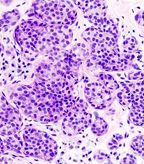HERA Trial: Invasive Lobular Breast Carcinoma Patients Derived Same Benefit From Trastuzumab Maintenance
In the HERA trial, benefit for invasive lobular breast cancer patients with 1 year of trastuzumab maintenance was similar to invasive ductal carcinoma patients.
Patients with invasive lobular breast cancer who participated in the HERA (Herceptin Adjuvant) trial derived similar benefits from 1 year of trastuzumab maintenance therapy as those patients with invasive ductal carcinoma. The results are published in the Journal of Clinical Oncology.

Invasive lobular carcinoma demostrating a predominantly lobular growth pattern
The retrospective analysis compared outcomes of the 187 patients with invasive lobular breast cancer to those 3,213 patients with invasive ductal carcinoma. Patients were followed up for 4 years.
One year of maintenance therapy with trastuzumab (Herceptin) is the standard of care for women with HER2-positive breast cancer treated in the adjuvant setting. The HERA trial showed that both 1 year of trastuzumab maintenance improved disease-free survival compared with no maintenance therapy. The trial results also showed that there is no advantage to 2 years of trastuzumab maintenance therapy compared with 1 year. These extended 8-year follow-up results were presented at last year’s San Antonio Breast Cancer Symposium by lead author Martine Piccart-Gebhart, MD, PhD, of the Institut Jules Bordet, Brussels.
At a median follow-up of 8 years, the disease-free survival was 76% for patients who received either 1 year or longer maintenance with trastuzumab. The original interim analysis at 3 years had suggested there may be a slight advantage of longer maintenance therapy (89.1% vs 86.7%) but the longer patient monitoring for another 5 years showed no added benefit of more than 1 year of therapy.
Patients were recruited to the trial between 2001 and 2005 with 5,102 patients randomized to either observation, 1 year of trastuzumab maintenance therapy, or 2 years of maintenance trastuzumab therapy. All patients received surgery and adjuvant or neoadjuvant systemic therapy prior to randomization.
The current analysis found both invasive lobular and invasive ductal carcinoma patients on the trial had similar patterns of disease relapse with respect to the first site where disease appeared. Disease-free survival hazard ratios comparing 1 year of trastuzumab to observation in the invasive lobular carcinoma group was 0.63, compared with 0.77 for the invasive ductal carcinoma group (P = 0.49). Overall survival similarly did not differ between the two patient groups-invasive lobular carcinoma patients had similar survival benefits from 1 year of trastuzumab as did those with invasive ductal carcinoma when compared with their respective patient groups that did not receive maintenance therapy.